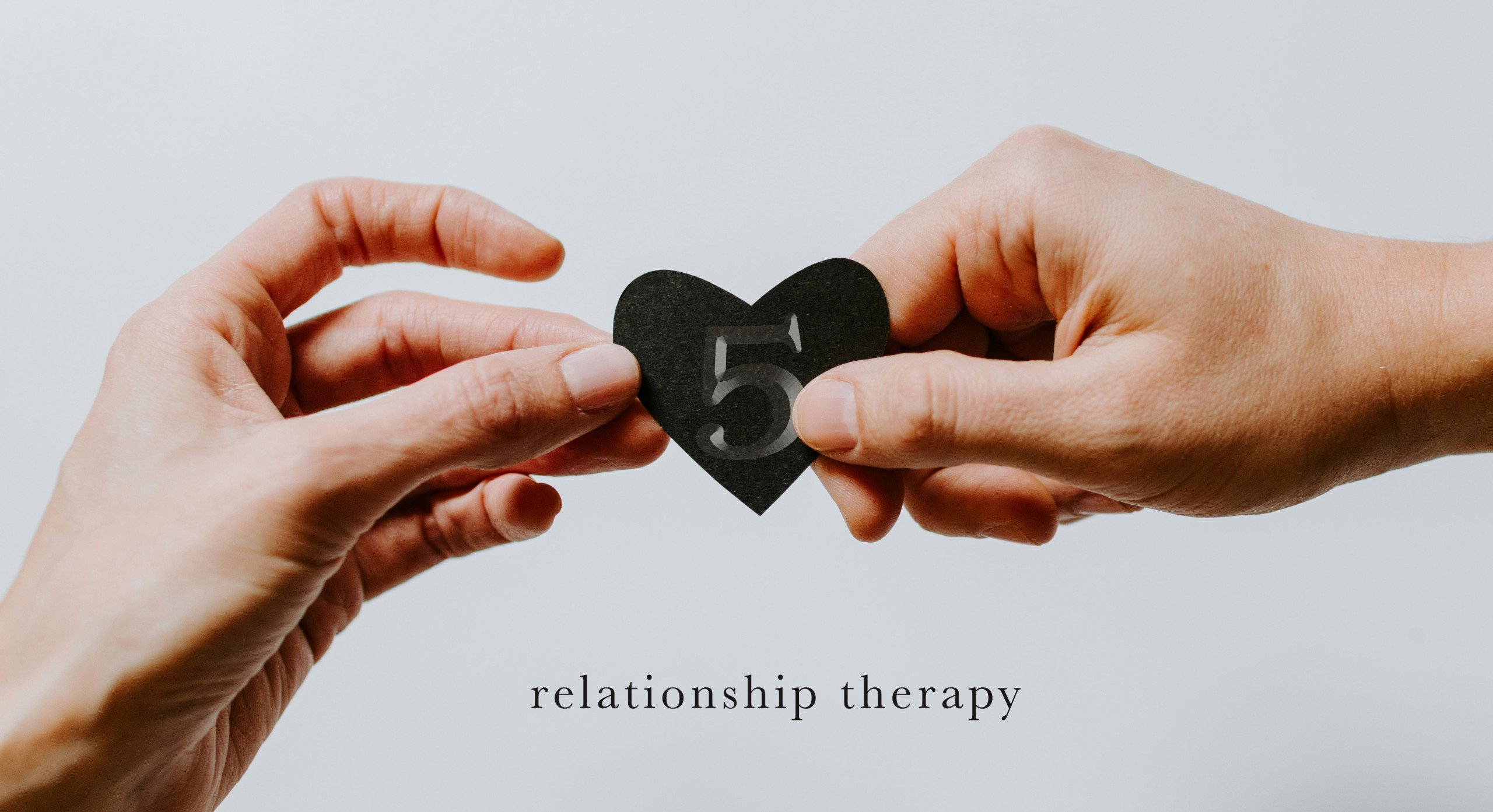Many people find the prospect of any kind of therapy daunting, but relationship therapy can help you learn so much about one another—and yourself. For over 15 years I have had the privilege of guiding couples through transformational therapy that creates deep, meaningful change for them as individuals as well as their partnerships.
But when is the best time to seek expert guidance?
These are the five most common reasons why people reach out for relationship therapy
It is important to point out that it’s rare for just one of the items on this list to exist by itself in any relationship. It’s more likely that there will be a few areas which are not working well for you. We want to connect meaningfully to our partner on every level, and if there is an issue for us (or them) in one area, that issue is bound to show itself in other areas of your life together as well.
1. Communication problems
Effective communication is fundamental to the health of any relationship, encapsulating not just the exchange of words but also when and how you communicate with each other. I have trained with The Gottman Institute in the US, which for 50 years has been at the forefront of studying people’s relationships, from how they act with each other to how they communicate. They have identified four patterns of communication that indicate when a relationship needs help. The Institute calls it The Four Horsemen, and they say they can predict whether a couple will split up based on the prevalence of the following four things: criticism, stonewalling, defensiveness, and contempt.
- Criticism attacks a partner’s character, leading to defensiveness rather than addressing specific issues.
- Stonewalling involves withdrawing from interactions, leaving the other partner feeling isolated.
- Defensiveness is a reaction to criticism where one partner shifts blame, preventing resolution.
- Contempt, the most damaging, shows disrespect and lack of appreciation, eroding the relationship’s foundation and actually causing physical disease if subjected to it for a prolonged period of time.
These communication challenges reflect underlying problems like unmet needs or unresolved conflicts. Relationship therapy replaces these harmful patterns with constructive communication skills that foster openness, empathy, and connection. Techniques such as active listening exercises and emotional regulation strategies are used to encourage positive interactions. By understanding and addressing the root causes of The Four Horsemen, couples learn to communicate more effectively, strengthening their relationship. This focused approach in therapy helps partners unravel complex emotional issues, paving the way for renewed intimacy and a deeper bond. Through improving communication, you can transform your relationship into a more understanding, empathetic, and resilient partnership.
2. The fading of desire and onset of boredom
As relationships evolve, the initial whirlwind of desire and attraction often settles into a comfortable routine. This transition, while it can be a natural part of relationship development, can lead to a sense of monotony and disconnection if not actively addressed. The highs and excitement of early relationship passion can fade into the background of daily life, especially if children come along or another significant change occurs in your life, like a high-powered job or a house move. If your relationship feels more like you’re sitting on the edge of the dance floor rather than doing the horizontal dance of love, it’s probably time for you and your partner to take deliberate steps towards maintaining and reigniting your romantic and intimate connection.
In the therapeutic context, couples are guided through processes that aim to reopen the doors to intimacy, exploring and discovering new dimensions of their relationship. Therapy encourages partners to articulate their desires, fantasies and needs that may have been suppressed or overlooked through sexual communication. By engaging in exercises designed to enhance emotional and physical connection, couples can break through the barriers of routine, rediscovering the excitement, joy, and profound connection that brought you together. It provides a safe and supportive space for you to navigate your way back to a fulfilling intimate bond—whilst bearing in mind that your desires may have changed with time, as you both will have done.
3. Inability to move on from a painful event
Traumatic events in a relationship, such as infidelity, loss, or feeling overlooked or unsupported by your partner at a time you really needed them, can create deep psychological scars, impacting both individuals and the relationship as a whole. When these events are not adequately recognised, processed, or healed, they can lead to lingering resentment, mistrust, and emotional disconnection. The pain becomes a shadow over the relationship, preventing partners from fully engaging with each other and building a future together.
Therapeutic intervention offers a beacon of hope for couples ensnared by past trauma. Through therapy, couples learn to navigate and communicate about their pain, understand its impact, and work towards forgiveness and rebuilding trust. This process is not just about moving past the event itself but about strengthening the relationship’s foundation, ensuring that both of you feel seen, heard, and valued. By fostering an environment of mutual support and understanding, therapy helps couples set the groundwork for a path leading to a more resilient and loving future.
4. To rediscover each other
The incessant demands of daily life—careers, children, social obligations—can gradually erode the intimacy and connection between partners. Over time, individuals within the relationship will grow and change, sometimes feeling as though they or their partner have become unrecognisable compared to the person they fell in love with. This perception can lead to feelings of disconnection and misunderstanding as you struggle to reconcile your evolving selves with the memory of your early relationship.
Therapy provides an invaluable opportunity for couples to pause, reflect, and engage with each other in new and meaningful ways. It offers a space to explore how each of you has changed, to celebrate those changes, and to understand how you can enrich the relationship rather than drive a wedge between you. It encourages you to see each other with fresh eyes, appreciating the depth, complexity, and beauty of your journey together. This renewed perspective can revitalise the relationship, inspiring a deeper love and commitment to your shared future.
5. To part lovingly and respectfully
Sometimes, the most loving decision is to part ways. But even when you know it’s the best thing to do it can feel overwhelming and scary to make that leap into a future that you hadn’t planned for when you made the commitment to your partner. Therapy supports couples in navigating this transition with dignity and respect, focusing on compassionate uncoupling and, when necessary, co-parenting strategies that prioritise the well-being of all involved.
Can relationship therapy be avoided?
It depends on how deep-seated any ill-feeling or behaviours are in your relationship. If they are not entrenched behaviours, you and your partner may be able to discuss your feelings about the situation and your needs and desires about it calmly and reach a solution that suits both of you. Cast your mind back to the last time an upsetting event happened. What was going on for you both right then? Many couples have ‘the same argument’, a theme that surfaces again and again, sometimes for years. Usually, it’s very easy to identify what is happening from a superficial level, but it can be rather difficult to pinpoint why these dynamics are happening and know how to stop them. If this proves too difficult for you both to unpack, this is where a therapist can help.
When to seek help
Recognisng the signs that your relationship could benefit from professional guidance is crucial. Whether you’re facing communication challenges, a loss of intimacy, unresolved trauma, or a desire to deepen your connection, therapy offers a supportive and transformative path forward.
The Therapeutic Journey: A Path to Transformation
Therapy is an act of courage, an investment in the future of your relationship. The process I have devised and use with clients is marked by three phases:
1. Releasing Negativity: The journey begins with identifying and clearing the negative influences that cloud the relationship, paving the way for healing and forgiveness.
2. Developing Positivity: Building on this clarity, we enhance the relationship’s strengths, focusing on communication, shared goals, and trust.
3. Anchoring Change: The final phase solidifies these positive changes, creating lasting patterns of interaction and connection.
Conclusion
Seeking relationship therapy is a profound act of love, marking the beginning of a transformative journey that will deepen the bond between you. It offers a unique opportunity to address challenges, heal wounds, and evolve together in a supportive environment, guided by strategies tailored to each couple’s distinct needs and dreams.
The therapy journey may appear to be challenging at first glance but what you will get from it more than outweighs any initial discomfort you may feel. Taking the step into therapy shows that you both believe in the love you have created and the potential for positive change, allowing you to emerge stronger, more connected, and rejuvenated in your commitment to each other.



